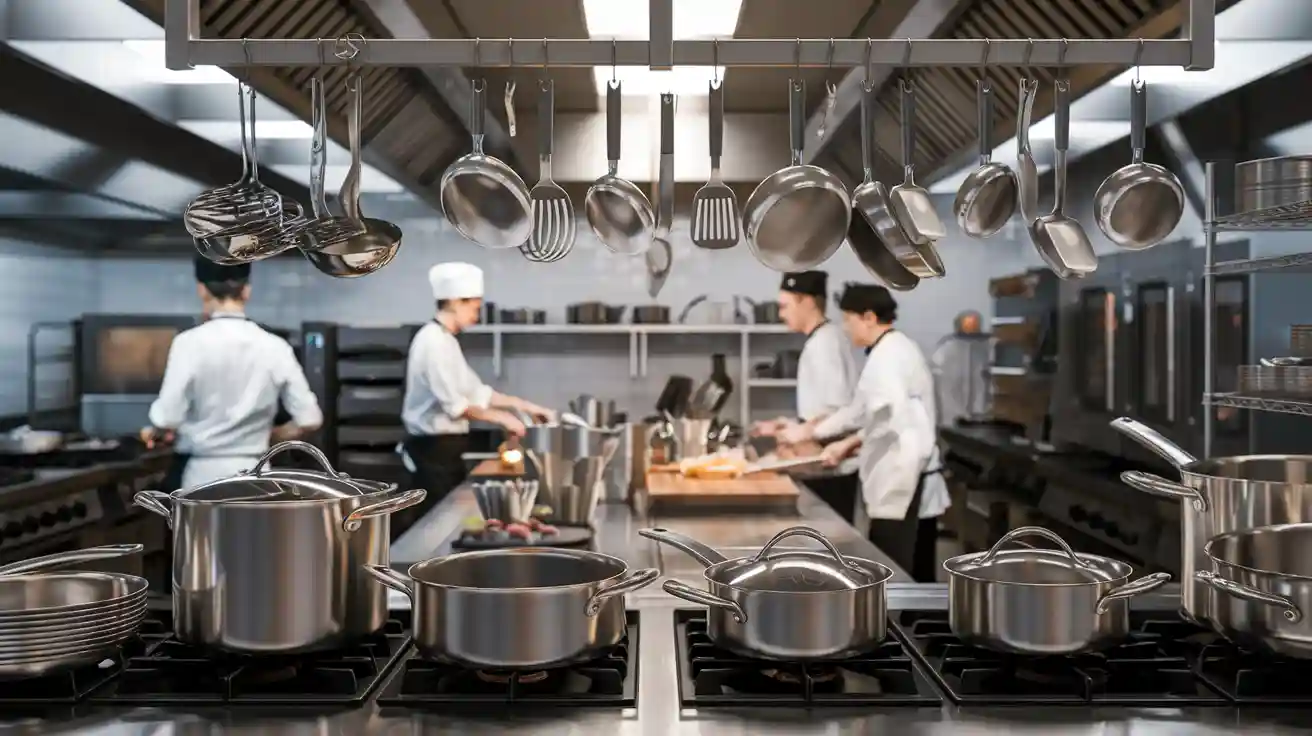
You demand the best material for commercial kitchen equipment. Stainless steel cooking equipment delivers unmatched hygiene and cleanliness. Research shows food-grade stainless steel resists rust and limits toxic metal release, improving food safety. Its smooth surface in stainless steel commercial kitchens prevents bacterial growth, ensuring a hygienic kitchen environment and supporting the food service industry’s quality standards.
Choose stainless steel kitchen equipment for reliable commercial kitchen equipment material and lasting quality in a hygienic environment.
Practical Benefits of Stainless Steel Cooking Equipment in Commercial Kitchens
Hygiene and Food Safety Advantages
You need to maintain the highest hygiene standards in your kitchen. Stainless steel cooking equipment gives you a nonporous surface that is easy to clean and sanitize. Food-grade stainless steel resists rust and prevents toxic metal leaching, which helps you protect your customers’ health. Stainless steel kitchen equipment supports allergen removal and food safety by not allowing bacteria or allergens to hide in cracks or pores.
- Stainless steel surfaces are easy to clean, making them ideal for quick sanitation between shifts.
- AOAC International certified test kits for detecting viruses on stainless steel, showing that you can monitor cleanliness with confidence.
- NSF International found that ATP hygiene monitoring systems work best on stainless steel, giving you accurate results for sanitation checks.
- Modifications like nano-coatings and copper ion deposits on stainless steel can reduce bacteria by up to 99%, further improving hygiene.
You can trust stainless steel commercial kitchens to deliver the cleanliness and food safety your operation demands.
Durability and Resistance to Corrosion
You want equipment that lasts. Stainless steel kitchen equipment offers high durability and corrosion resistance, even in harsh commercial kitchens. Food-grade stainless steel, especially grades like 304 and 316, stands up to frequent use, cleaning, and exposure to chemicals. Electrochemical corrosion resistance tests show that stainless steel resists pitting and crevice corrosion, even in environments with high humidity or salt.
- Stainless steel exhibits excellent durability and corrodes much slower than other metals.
- Nickel and chromium in food-grade stainless steel form self-healing oxide layers, making it resistant to chemicals and harsh conditions.
- Studies show that stainless steel’s mechanical properties, such as tensile strength and heat resistance, make it suitable for demanding applications.
- Stainless steel commercial work tables made from SS201 or SS304 provide heavy-duty support and improve kitchen workflow.
A table comparing key performance indicators highlights why stainless steel is the preferred choice:
| Key Performance Indicator | Stainless Steel 316 | Stainless Steel 304 | Stainless Steel 201 | Other Metals |
|---|---|---|---|---|
| Brinell Hardness (HB) | 310.13 | 276.13 | 286.49 | Variable |
| Impact Strength (Izod) | Highest | Moderate | Lower | Variable |
| Corrosion Resistance | Excellent | Very good | Good | Variable |
| Availability | High | Very High | Moderate | Lower |
You get reliable, durable restaurant equipment that stands up to daily challenges and delivers long-term value.
Cost-Effectiveness and Long-Term Value
You want to maximize your investment. Stainless steel cooking equipment may have a higher upfront cost, but its cost-effectiveness and value over time make it the smart choice. Studies show that stainless steel equipment reduces maintenance and repair costs, thanks to its corrosion resistance and longevity.
| Application Sector | 5-Year ROI (%) | Payback Period (Years) | Key Cost Factors |
|---|---|---|---|
| Sterile Environments | 185-500 | 1.2-3 | Labor savings, reduced maintenance, improved compliance |
- Stainless steel VHP passbox systems show a 5-year ROI of up to 500%, with payback periods as short as 1.2 years.
- Labor savings, reduced maintenance, and improved compliance drive these returns.
- Modular designs and upgrade options extend the life and value of your equipment.
You benefit from lower lifecycle costs, fewer repairs, and a longer service life, making stainless steel kitchen equipment a wise investment for any commercial kitchen.
Safety and Compliance with Food Service Industry Standards
You must meet strict safety and regulatory standards in the food service industry. Stainless steel equipment helps you achieve and document compliance. Environmental Health and Safety Management System audits rely on maintenance and operational records to verify that you follow safety protocols.
Well-maintained stainless steel kitchen equipment provides clear evidence of compliance during regulatory audits. Maintenance records show that you perform regular safety checks and inspections, which demonstrates your commitment to safety and continuous improvement.
A summary table shows how maintenance records support compliance:
| Safety Aspect / Regulatory Aspect | Role of Maintenance Records | Impact / Compliance Benefit |
|---|---|---|
| Risk Identification | Analyzing system performance trends | Enables early hazard detection |
| Protocol Development | Using incident reports | Improves safety protocols |
| Training Programs | Historical maintenance data | Enhances safety awareness |
| Compliance Assurance | Documenting safety checks | Demonstrates regulatory adherence |
| Performance Monitoring | Logging inspections | Shows consistent safe operation |
| Incident Reporting | Detailed safety event accounts | Supports corrective actions |
You ensure a safer kitchen environment and meet the highest standards with stainless steel cooking equipment.
Versatility, Aesthetics, and Environmental Impact in the Food Service Industry

Adaptability and Customization for Commercial Kitchens
You need equipment that adapts to your kitchen’s changing needs. Stainless steel offers unmatched versatility. Manufacturers design modular cooking stations and appliances that you can reconfigure as your menu or workflow changes. You can choose large equipment with wheels or easy assembly, making it simple to move or adjust your layout for special events. Many kitchens use multifunctional appliances, like combination stoves, to save space and boost versatility. Removable parts and smooth surfaces make cleaning fast and support hygiene. This adaptability lets you scale your kitchen as your business grows.
- Modular designs allow you to add burners or stack refrigeration units.
- Compact, multifunctional equipment fits food trucks and small kitchens.
- Corrosion resistance and easy cleaning keep your kitchen safe and efficient.
Professional Appearance and Modern Design
You want your kitchen to look professional and modern. Stainless steel delivers a sleek, minimalist style that fits any decor. Its clean lines and metallic finish create a bright, open space. Design experts say stainless steel kitchens look timeless and practical. This material resists heat and corrosion, so your kitchen stays attractive over time. Many restaurants choose stainless steel to boost property value and create a professional image for staff and customers.
Environmental Benefits and Sustainability
You care about the environment and want to run a responsible kitchen. Stainless steel supports sustainability in several ways:
- Recycling stainless steel reduces landfill waste and harmful emissions.
- Using recycled metals saves energy and conserves natural resources.
- Sustainable disposal practices support a circular economy.
- Responsible recycling improves your brand reputation and helps you meet regulations.
- Many manufacturers now use energy-efficient production methods.
Stainless steel’s versatility extends to its environmental impact. You can recycle it completely, and its durability means you replace equipment less often. This reduces your kitchen’s footprint and supports long-term efficiency.
Stainless steel equipment gives you unmatched hygiene, durability, and efficiency.
- Smart features like automation and energy-saving designs lower costs and boost productivity.
- The market for stainless steel kitchenware is growing fast, driven by demand for safe, sustainable, and modern solutions.
Upgrade now to future-proof your kitchen and meet industry standards.
FAQ
What makes stainless steel better than other materials for commercial kitchens?
You get superior hygiene, durability, and easy cleaning. Stainless steel resists corrosion and heat. Other materials often stain, rust, or break down faster.
How do you maintain stainless steel kitchen equipment?
- Clean surfaces daily with mild soap and water.
- Dry equipment after washing.
- Avoid harsh chemicals or steel wool to prevent scratches.
Is stainless steel equipment environmentally friendly?
You can recycle stainless steel completely. Manufacturers often use recycled materials. This reduces waste and supports a sustainable kitchen operation.


